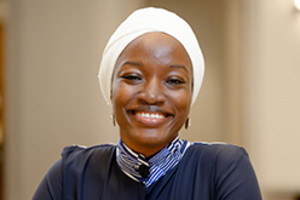
Angela Seidu is a first-year MGA student from Ghana focused on youth empowerment, community development, and gendered peacebuilding frameworks. During her five-year career with Catholic Relief Services (CRS), Angela implemented and managed migration and youth-led employment programs in West Africa and incorporated gender equity as part of peace approaches. In this Student Q&A, Angela discusses women in peacebuilding, obstacles to community development, and her Kroc experience thus far.
Tell us about your journey with CRS.
I began as an intern focused on promoting peace in northern Ghana. Partnering with Notre Dame professor Jaimie Bleck, I used the 2016 Ghanaian election as a case study to determine how we could use youth to advocate for peace, as they had been used as weapons of violence during the election. Later, I transitioned to working on a youth livelihood project. We provided technical application skills training, such as carpentry, electricity, fabric weaving, and beauty services – alternatives to youth being used as weapons of violence due to a lack of socio-economic opportunities. I also worked on the Sahel Peace Initiative, where the focus centered on preventing conflict spillover from Burkino Faso and Togo.
In your line of work, how does gender equity intersect with peacebuilding?
Women can make or break peace, but they are being sidelined in communities, especially in Ghana. Women are key to sustaining peace. We have to include women and children, as they are the ones largely affected by conflict in communities. This also affects rural community development. In Ghana, work is highly patriarchal, which is a detriment to growth. By giving women the opportunity to spearhead decisions, communities grow. Empowering women means more development for local communities.
Why did you decide to study peace?
I got to a point in my career where I couldn't transition without a higher degree. My bachelor’s degree was not enough. I had exposure to Notre Dame and its research through my connection with Dr. Bleck. I was drawn to studying how to best integrate women into international and regional peace and security agendas through the international peace studies concentration and the minor in gender studies. I wanted to be part of a program that would provide theoretical and practical knowledge on how to handle these big issues, and knew I could find that at the Kroc Institute and Keough School of Global Affairs.
What has your experience been like with the Kroc thus far?
I have acquired knowledge on how to better navigate local challenges in peacebuilding. Pursuing a minor in gender studies has helped me understand gender dynamics in peace while exploring the intersection of identity and impact. I have a lot of unanswered questions on gender relations in peace and security, but I am confident by the time I’m done with the program, I’ll have the tools to address and answer those questions.
Where do you see yourself after graduation?
I intend to work with more international organizations. My interest is in humanitarian peacebuilding, in the development space. Some of the challenges I encountered at the grassroots level went unresolved, so I am interested in leadership management and policy evaluation, complemented by better peacebuilding practices.
Where are you on the Strategic Peacebuilding Wheel?
Trauma healing, violence prevention, and development. I have realized through my work that trauma has a long-term impact, even post-conflict, and most circles do not hold the proper terminology or tools concerning trauma. I see myself operating in that area to ensure sustainability, which leads to stronger violence prevention practices and opportunities for development.